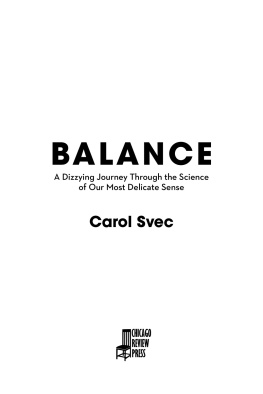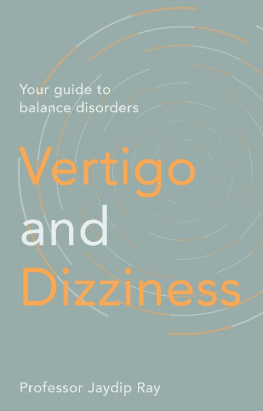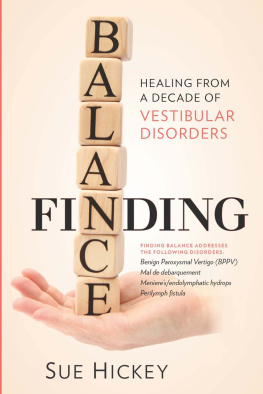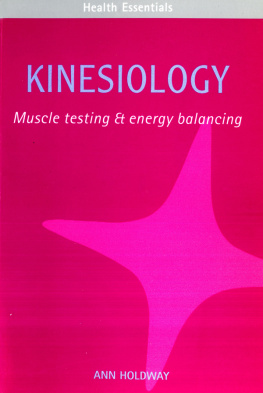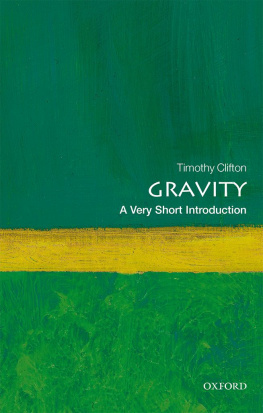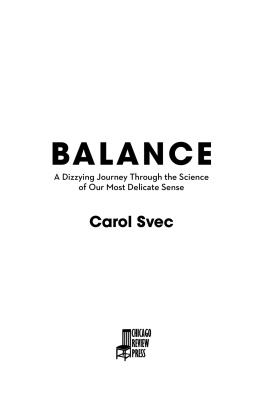Introduction
W HEN IT COMES TO BALANCE, ballerinas, circus performers, surfers, and gymnasts have nothing on you.
From the moment you wake up in the morning, daily life is a harrowing high-wire act. Its more than simply sitting upright or standing firmly on your feet without toppling over, although those are the most apparent aspects. To sit upright and not topple over requires having a solid sense of which way is up, so you can avoid falling down. It also means knowing where your body is in space and how to organize and move your muscles so that you can maintain your position. It requires a kind of internal gyroscope to keep the head level, a method for detecting gravity (so we dont fall victim to its pull), and a way to link what we see with how we move (so life doesnt look like a herky-jerky handheld video). Each step we take is a miracle of balance as our bodies compensate for hundreds of tiny changes in weight distribution and body position.
Without realizing it, we areeach of us (most of us)a hair away from collapsing in a heap on the floor. I mean that literally. There are groups of tiny sensory hair cells in the core of the vestibular system within the inner ear that sense movement, acceleration, and gravity. When something goes wrong and those hair cells send the wrong message to the brainas happens with Mnires disease or benign paroxysmal positional vertigo (BPPV)the result is incapacitating vertigo and dizziness.
But the sense of balance extends way beyond the inner ear. Nearly every cell in our bodies plays a role. Simply standing in place requires contributions from our eyes, ears, brain, nerves, joints, ligaments, blood, and bones in a symphony of coordination. Take away one factor and the body can usually compensate. Take away two and we may end up in a heap on the floor.
And yet, we dont think about this remarkable, exquisite ability we have until we find ourselves in unusual situations that stress the system, such as crossing an icy mall parking lot when youre overloaded with shopping bags. (I speak from experience.) All of a sudden, your firm footing is lost on the slick pavement and you have to think about each step, while simultaneously adjusting for the weight of your purchases. You plant a foot, pause, make a balance judgment, slowly lift your other foot until you know whether youre solid, take the step, plant the foot, and so on, until you reach your car. Its exhausting. And for a handful of people with a very specific proprioceptive disorder, a carpeted room is as challenging as that icy pavement.
So when you think about it, theres not much difference in physical skill required to walk a tightrope as there is in... well, just plain walking. I have spent the past year talking with physicians and researchers, visiting their offices and labs, learning about what balance really means. How do we accomplish this pure physical poetry every minute of every day?
What I discovered is that we dont have a sense of balance. We are balance. Balance gives us our place and space in the world, but it also contributes to our sense of self. After all, a dream of flying is impossible if you dont know which way is up.
I was inspired to write this book because of what happened to my mother. Back in December 2012, after a day of shopping, she lost her balance walking up the three little steps that led from the garage into her home. She fell backward onto the concrete garage floor, directly onto her head. Her only other injury was a slight scrape on the side of her arm, which flailed out in an automatic attempt to keep from falling. Just moments earlier, she had been lively, alert, and stable. But just three little steps and a quirk of balance later, she was unconscious.
Im happy to report that my mom had a miraculous recovery (the neurosurgeons words, not mine), despite skull fractures in two places and three areas of bleeding in her brain. We still dont know what made her lose her balance. Testing showed she did not have a stroke, had taken no medication or alcohol, and wasexcept for these most recent injuriesentirely healthy.
So why did she fall? And, perhaps more importantly, how come more of us dont fall? What keeps our balance steady? What happens when balance fails? Why are we so certain that we can come home from a trip to Bed Bath & Beyond and not end up in an ambulance? And what, exactly, does it take to knock us off our feet?
How to Use This Book
I want to make clear that I am not a medical doctor. (There probably isnt much risk of anyone making that mistake, but still.) This book was written to track my own exploration of the amazing world of balance research. It is not a compendium of disorders, and it should not be used to self-diagnose. If you recognize your own symptoms within these pages, please see a balance specialist, who can properly test, diagnose, and treat your very individual condition.
The information in this book has been arranged in a way that builds knowledge, so that by the time you reach the last chapters, you can see how all the disparate and sometimes seemingly random bits of information come together. You can read the chapters in any order you like, but some of the concepts will make more sense if you read from the beginning.
After more than eighteen months of research, interviews, and writing, I have had two revelations. The first is that balance research is conducted by a tight-knit group of scientists with a high level of camaraderie and respect. The individuals you will meet in this book are among the top in their fields, yet they wanted to make clear that their work was part of a team effort. The second revelation is that my most overused phrase is Oh, wow! I have said it on the phone while talking with physicians and in person when I visited the labs of balance researchers. Most of the time, the scientists would reply with something along the lines of I know! Its cool, isnt it? It is a joy to write about scientific concepts when the experts are as excited as I am to talk about their work. My hope is that, at some point while you are reading, you also find yourself thinking, Oh, wow!
S INCE THE 1960s, when there were no ethics boards to review the designs of university studies using human subjects, research psychologists have battled the suspicion that they are mad scientists searching for the secrets of mind control. As professor Andrea Bubka leads me down into her motion sickness laboratory, it strikes me that she isnt doing her profession any favors. Well, not Dr. Bubka herselfshe has an open, cheerful face that I trust at first sight. Shes trim, petite, and with blonde hair ideal for an academicneither too long nor too short, neither too severe nor too mussed, neither styled nor sloppy. Goldilocks hair: everything just right. Plus shes wearing pearls. How can you not trust someone in pearls?
Rather, it is her lab that evokes fears of psychological sadism. Apart from the bright lighting, it looks like something out of a high-tech horror movie. Its a long bunker, with a gray concrete floor, cinderblock walls, and industrial fluorescent lighting. Off in the corner of the room is a wood and metal structure dangling a cylinder five feet tall and five feet in diameter. In the motion sickness research community, this device is infamous: the Vominator.

